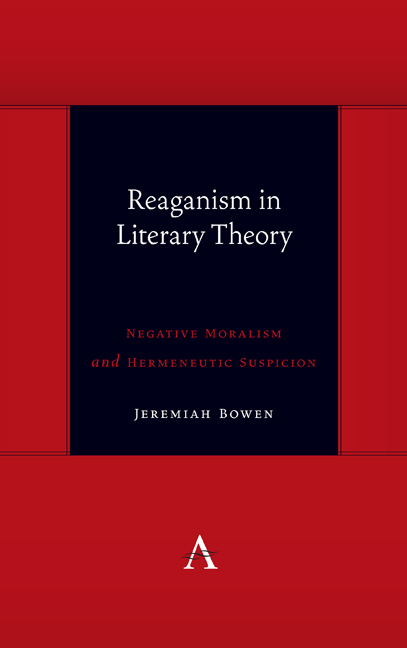Book contents
- Frontmatter
- Contents
- Acknowledgments
- Essay One Interpretive Politics: Reading Systemic Oppressions with Eve Sedgwick, Stephen Best and Sharon Marcus
- Essay Two Devotional Scholarship: Reading Academic Reaganism with Edward Said, Stanley Fish and Walter Jackson Bate
- Essay Three Negative Moralism: Reading Literariness, Materiality and Revolution with Paul de Man and J. Hillis Miller
- Index
Essay Three - Negative Moralism: Reading Literariness, Materiality and Revolution with Paul de Man and J. Hillis Miller
Published online by Cambridge University Press: 21 July 2020
- Frontmatter
- Contents
- Acknowledgments
- Essay One Interpretive Politics: Reading Systemic Oppressions with Eve Sedgwick, Stephen Best and Sharon Marcus
- Essay Two Devotional Scholarship: Reading Academic Reaganism with Edward Said, Stanley Fish and Walter Jackson Bate
- Essay Three Negative Moralism: Reading Literariness, Materiality and Revolution with Paul de Man and J. Hillis Miller
- Index
Summary
We could call it the moment of “peak theory” in US literary studies. At the Modern Language Association's 1986 conference, J. Hillis Miller titled his Presidential Address “The Triumph of Theory.” In the next year Yale deconstruction's disciplinary influence and institutional power, which Miller already describes as waning, would collapse under the weight of scandal. But at this moment, Miller can still make a claim for theory's hegemony. Not by announcing “triumph,” which is here intended with some dramatic irony, but by designating with the unmarked universality of “theory” the partiality and particularities of the group Miller had named the “Yale Critics.” From among this group, Miller names Paul de Man as providing the primary warrant for granting their methods and objectives the title of “theory” simpliciter. Before his death nearly three years earlier, de Man had defined their methods and purposes in terms of attention to the arbitrary relation of sign to referent. In what Miller calls his “already classic” essay “The Resistance to Theory,” de Man charges that critics of deconstruction on the left and the right are driven by irrational denial of this arbitrariness, resisting theory's exposure of their reliance on a fantasy of reference.
In both de Man and Miller, theorists are depicted as patiently and reasonably weathering the vicious outrage of its opponents on “both sides,” as left and right critics desperately cling to an outmoded belief in the guarantee provided by naïve reference. As we will see, there is a significant measure of truth in this account, as conservative opponents often imagined those theorists as academic arsonists, or as barbarian invaders bent on the destruction of civilization. But while their complaints about conservatives are corroborated by textual evidence, their accusations against left critics are often not supported by the passages they cite. By conflating critics on the left and right, defenders of theory became participants in a general war of ad hominem disqualifications, indicating the limits of what Miller calls Yale deconstruction's “strategies of overturning and displacement.” Close attention to Miller and de Man will show recurring tropes of violent succession and narcissistic synecdoche that imagine disciplinary hegemony and change in a framework of personal rule. The familiarity of their premises suggests their persistent conditioning force in literary studies, influencing pervasive misrecognitions of materialism, moralism and social change.
- Type
- Chapter
- Information
- Reaganism in Literary TheoryNegative Moralism and Hermeneutic Suspicion, pp. 137 - 198Publisher: Anthem PressPrint publication year: 2020



